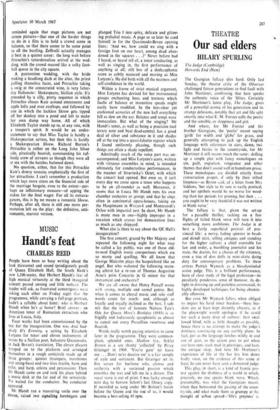Handt's feat MUSIC
CHARLES REID
People have been so busy writing about the look (tiresome) and sound (prodigiously good) of Queen Elizabeth Hall, the South Bank's new 1,106-seater, that Herbert Handt's feat of high musical virtuosity at the third inaugural concert passed unsung and little noticed. The reader will ask, as frustrated concertgoeis we:e asking each other on Friday night • (fur the programme, while carrying a full-page portrait, hadn't a syllable about him): who is Herbert Handt when he's at home? Brief answer: an American tenor of Rumanian extraction who lives at Lucca, Italy.
Four works had been commissioned by the cl.c for the inauguration. One was And Sud- denly It's Evening, a setting by Elisabeth Lutyens for tenor and eleven instruments of verses by a Sicilian poet, Salvatore Quasimodo, in Jack Bevan's translation. The eleven players trooped on to the platform and arranged themselves in a rough semicircle made up of three groups: quintet (trumpets, trombones and string-bass) and two trios (violin, horn and cello; and harp, celesta and percussion). Then Mr Handt came on and took his place behind a music desk at the far end of the semicircle. We waited for the conductor. No conductor appeared.
Mr Handt ran a reassuring smile over the eleven, raised two signalling forefingers and plunged Trio I into spiky, delicate and glitter- ing preludial music. A page or so later he cued himself in for the Quasimodo-Bevan opening lines: 'And we, how could we sing with a foreign foot on our heart, among dead aban-
doned in the squares . . .?' Never before had I heard, or heard tell of, a tenor conducting, as
well as singing in, the first performance of anything at all; still less of a dodecaphonic score as subtly nuanced and moving as Miss Lutyens's. He did both with all the neatness and self-confidence in the world.
Within a frame of strict musical argument, Miss Lutyens has devised for her instrumental groups enchanting hues and textures which faults of balance or insensitive speeds might easily have muddied. In the lens-clear yet cushioned acoustics of the new hall everything fell as dew on the ear. Balance and tempi were immaculate. But what of the singing? Mr
Handt's tenor, as well as being a precision tool (every note and beat dead-centre), has a good deal of silver and substance in it and shades off at the top into a quasi-falsetto register which I found uniformly pleasing, though such things are often a shade repellent.
Admittedly much of the voice part was un- accompanied; and Miss Lutyens's score, written with virtuoso ensembles in mind, is intended ultimately for conductorless performances, in the manner of Stravinsky's Octet, with which the concert had opened. But even so, it isn't every day we come upon a tenor who happens to be an all-rounder as well. Moreover, it seems that in Lucca Mr Handt runs his own chamber orchestra or group; and that he sings often in continental opera-houses, taking on the Hauptmann in Wozzeck and Monteverdi's Orfeo with impartial zest. In short, Mr Handt is many men in one—highly improper in a vocation which craves for demarcation lines as much as any shipyard.
What else is there to say about the QE Hall's inauguration?
The first concert, graced by Her Majesty and repeated the following night for what may be called a lay public, was one of those old- to-mod English music conspectuses which are so musty and quelling. We all know that George Malcolm plays the harpsichord like an angel. But who wakened the following morn- ing athirst for a re-run of Thomas Augustine Arne's prim Concerto in G minor for that instrument and orchestra?
We are all aware that Henry Purcell wrote with strong, multiple and vernal genius. But, when it comes to choral music and solo stuff words count for much: and, although as loyally and royally inclined as the best, I sub- mit that the text of laureate Nahum Tate's Ode for Queen Mary's Birthday (1693) is so frigidly and ludicrously sycophantic as almost to cancel out every Purcellian sweetness and flourish.
Words really worth paying attention to came later in the programme. They were common- place, splendid ones. Shallow (i.e., • fickle) Brown is a sea shanty 'collected' by Percy Grainger in 1908. 'You're goin' ter leave me ... Don't neer deceive me' is a fair sample of style and sentiment. But Grainger set its five verses for baritone solo, chorus and orchestra with a sustained passion which ennobles the text and left me in a dream. The vocal score is out of print. I was lucky enough next day to borrow Schott's last library copy. If recorded as sung under Mr Britten's baton before the Queen and the rest of us, it would become a best-selling 45 rpm.






























 Previous page
Previous page